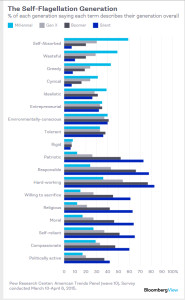Happy Monday! The mature marketing stories of the past week that drew the greatest amount of interest focused on how Boomers process information differently than younger generations, and how each generation rates itself in terms of morality and qualities that characterize their behaviors as citizens, earners and consumers.
Have something to share? We’d love to hear your thoughts so please note within our comment section.
MOST CLICKED: At Creating Results, we help our clients understand their target market through our own experience and empirical research about their behaviors. A recent Engage:Boomers story about how Boomers process information got right to the heart of why we need to look at them through a different lens. In “The Average Baby Boomer Market Doesn’t Exist,” author Jim Gilmartin hones in on how important emotional intelligence is in informing Boomers’ purchasing decisions — and how our messaging and delivery methods should take this into account.
Empirical studies generally have shown that Baby Boomers are relatively superior to younger adults in understanding emotional states. On the other hand, it appears that older minds tend to be slower in getting the picture when the information representing it is emotionally neutral (expository in nature)…. This suggests that often the best way to transmit objective, emotionally neutral information to Boomers is to piggyback it on, or sandwich it between, emotionally enriched information. Weaving information into an attractive tapestry that integrates “facts” into an emotionalizing matrix can satisfy the need of Boomer customers to gauge the potential emotional quality of the relationship before considering the product.
According to Gilmartin, research “suggests that the traditional focus of marketing communications and sales presentations on product features and benefits and other objective information reaches a point of diminishing returns more quickly among Baby Boomers.” Successful engagement with this target should motivate this group to act using emotion by creating an environment that typically reflects the following:
1. A process that eases the qualification process
2. An understanding of the changing communications process in Boomer customers
3. The development of a bond, a trusting relationship (vulnerability, honesty and integrity)
4. Continuing expressions of empathy not sympathy
5. An understanding of the value and effectiveness of storytelling and personal anecdotes
The moral of this story for marketers? By understanding and respecting the way that older adults process information, we can create more relevant content in a more appropriate style to deliver high-quality results in our ads and sales presentations.
Read the full article here and learn more.
MOST SHARED: A recent Pew study shows how each generation in the United States rates itself against a list of moral qualities. The study found that Millennials are the most likely to attribute negative traits to their generation. So why is this of concern to those of us looking at the older market? Well, as blogger Dick Stroud suggests, this “self-flagellation” of Millennials might mean the y are having a crisis of confidence. The problem is, he ads, “That is a bit worrying since they are the ones that have to work and pay the tax to look after the Boomers!”
y are having a crisis of confidence. The problem is, he ads, “That is a bit worrying since they are the ones that have to work and pay the tax to look after the Boomers!”
Millennials rated themselves highly in qualities generally considered negative, such as wastefulness and greed. Conversely (and alarmingly), they rated themselves poorly in qualities such as responsibility, working hard, and being moral and self-reliant — qualities for which the Silent and Boomer generations rated themselves highly. See the table below.
So what does this mean for us? It suggests that Millennial children do not share the same values as — and may not support the same priorities and needs of — their aging parents, even though they are the ones who will have to work and pay taxes that support the Boomer generation, whether they like it or not.
As a Boomer myself with a Millennial son, I am constantly reminded of how different from mine his worldview and priorities are, but at the core of things his values are not that dissimilar. I don’t believe he has a concept of what his perspective and needs will be when he is my age (36 years from now), but I do think he understands — thanks to a lot of honest sharing with his parents — that some of the most “old fashioned values” such as compassion, sacrifice and hard work, are still the keys to a successful and happy life . . . at any age.



